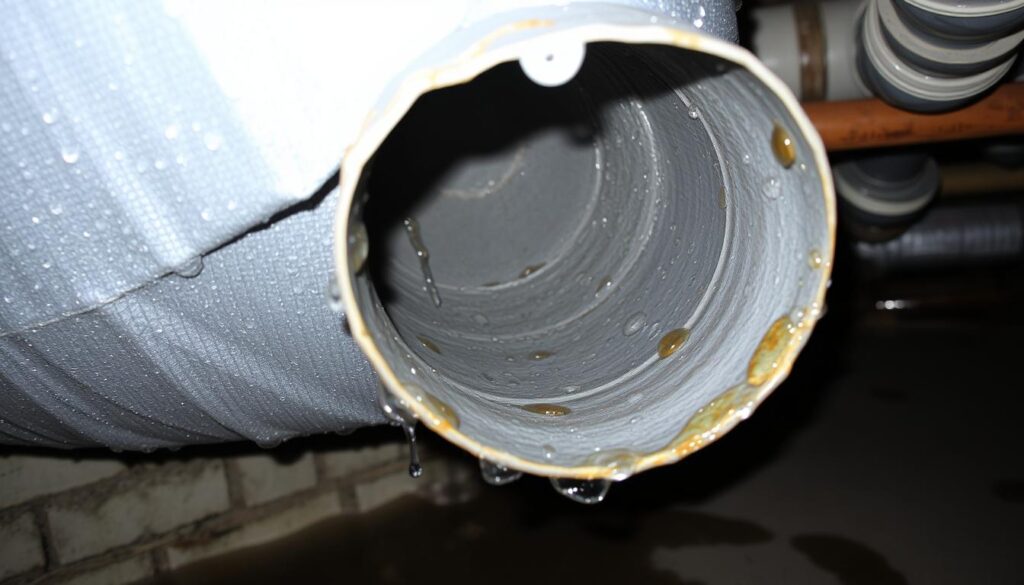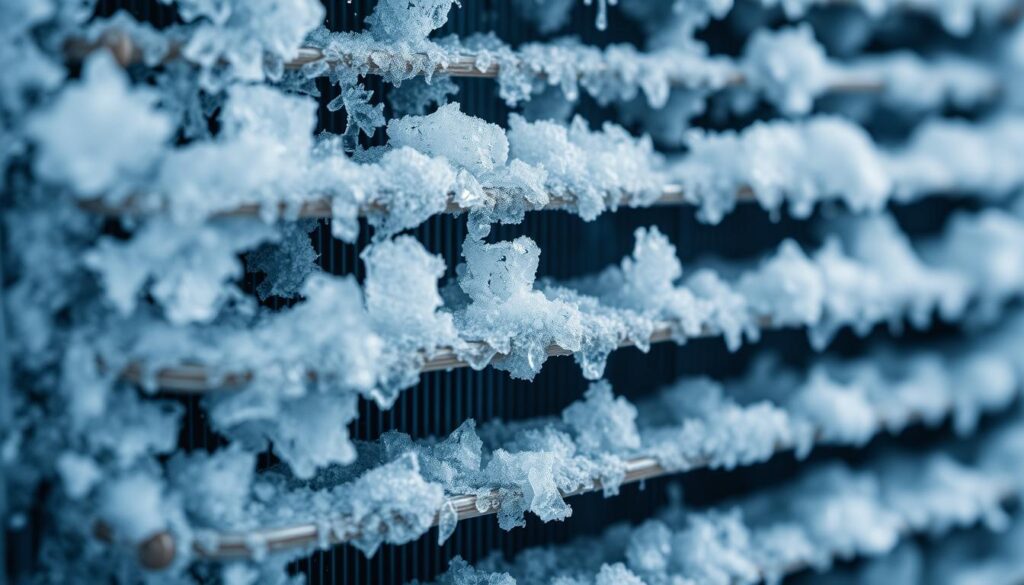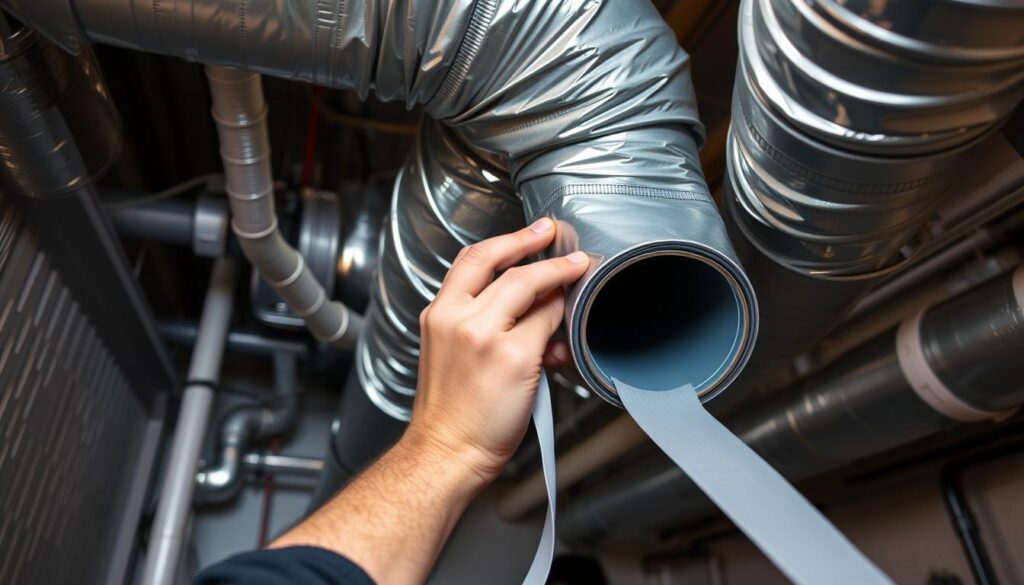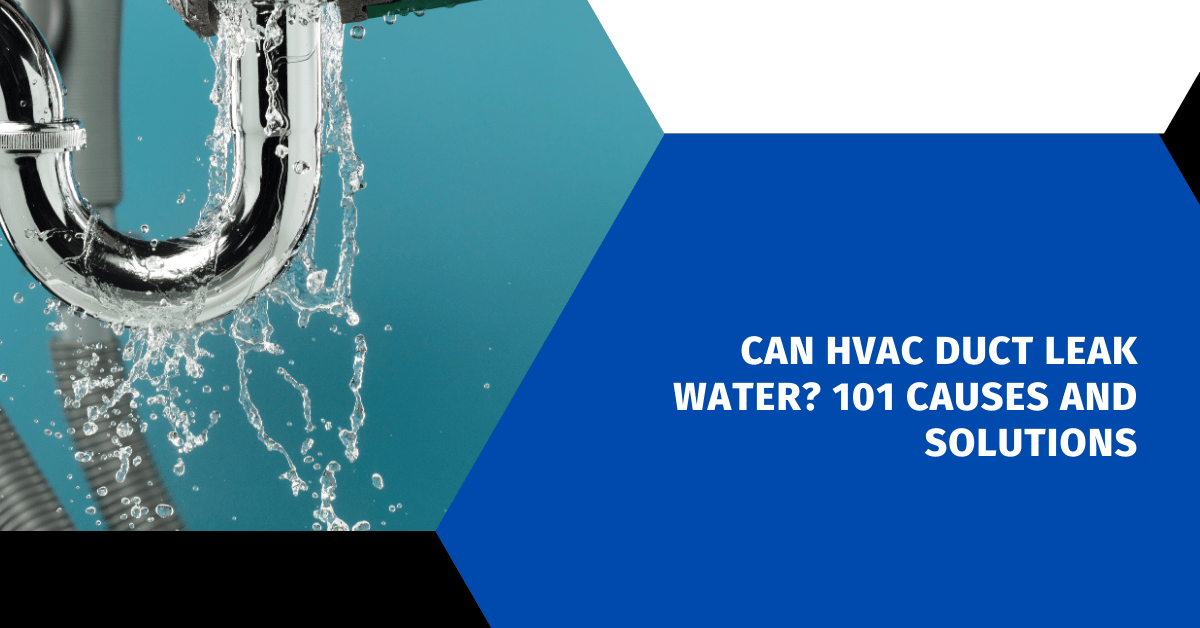Affiliate Disclosure
HVAC Guide Guys is a participant in the Amazon Services LLC Associates Program, an affiliate advertising program designed to provide a means for sites to earn advertising fees by advertising and linking to Amazon.
Can HVAC Duct Leak Water? Imagine coming home on a hot summer day, ready to cool down with your AC. But, you see water dripping from the vents. This can mean there’s a bigger problem with your HVAC ductwork. While some moisture is normal, too much water leaking is a sign of trouble.

Key Takeaways
- HVAC ducts can leak water due to various issues, including dirty air filters, frozen evaporator coils, clogged condensate drain lines, and more.
- Ignoring these problems can lead to mold growth, water damage, electrical hazards, and reduced HVAC efficiency.
- Regular maintenance and prompt repair of HVAC duct leaks are crucial to maintain a comfortable, safe, and energy-efficient home.
- Consulting with HVAC professionals is recommended to diagnose and address the underlying causes of water leaks in your ductwork.
- Preventive measures, such as cleaning air filters and maintaining condensate drain lines, can help minimize the risk of HVAC duct leaks.
Table of Contents
Understanding HVAC Duct Systems and Water Issues
Your HVAC system’s ductwork is key to spreading air around your home. It’s made up of supply and return ducts, vents, and registers. Knowing about these parts and common water problems can help you fix any issues.
Basic Components of HVAC Ductwork
The main parts of an HVAC duct system are:
- Supply ducts: These carry conditioned air to different rooms in your home.
- Return ducts: These bring air back to the HVAC unit for cooling.
- Vents and registers: These let conditioned air flow into and out of rooms.
Normal vs. Problematic Condensation
Some condensation in ductwork is normal, especially in warm, humid places. It happens when cool air meets warmer outside air. But, too much condensation means you have a problem that needs fixing.
Signs of Water Leakage in Ducts
Look out for these signs of water leakage in your HVAC ductwork:
- Water dripping from vents or registers
- Stains on ceilings or walls near the ductwork
- Musty or damp odors coming from the HVAC system
Fixing these problems quickly can stop more damage. It also keeps your HVAC system working well and safely.
Explore Our HVAC Shop
Looking for top-rated HVAC tools, parts, and accessories? Visit our shop and find the perfect solution for your needs.
Visit the ShopCan HVAC Duct Leak Water: Common Causes
Your HVAC system keeps your home comfy, but it can also leak water. Knowing why HVAC ducts leak is key to a dry, healthy home.
Dirty air filters are a big reason for HVAC water leaks. When air filters get too full, they block air. This makes the evaporator coil freeze, causing water to build up and AC vent water dripping.
Frozen evaporator coils are another problem. This can happen if there’s not enough refrigerant, poor air flow, or a bad thermostat. When coils freeze, they can’t drain water properly, causing duct system problems like leaks.
| Cause | Impact |
|---|---|
| Clogged condensate drain lines | Water backing up and leaking from vents or ducts |
| Cracked or damaged drip pans | Leaks from the unit’s base |
| Broken condensate pumps | Inability to properly remove excess moisture |
| Refrigerant leaks | Decreased system efficiency and potential water leaks |
Other reasons include bad installation, air duct leaks, and not enough insulation. Fixing these problems fast can stop water damage and keep your HVAC running well.
Knowing why HVAC ducts leak is the first step to fixing it. By being quick to spot and fix problems, you can keep your HVAC system working great. This ensures your home stays dry and comfy.
Explore Our HVAC Shop
Looking for top-rated HVAC tools, parts, and accessories? Visit our shop and find the perfect solution for your needs.
Visit the ShopThe Role of Condensate Drain Systems
The condensate drain system is key to your HVAC unit’s proper function. It removes water from the cooling process. This stops water buildup that could harm your home or air quality.
Condensate Drain Line Function
The condensate drain line collects water from the evaporator coil. It then sends it outside your home. This keeps your HVAC system running well and avoids water damage, mold, and mildew.
Common Drainage Problems
- Clogged drain lines: Debris, algae, and minerals can block the line. This causes water to back up and overflow.
- Cracked or rusted drain pans: These can leak over time, causing water damage.
- Overwhelmed drainage capacity: Newer HVAC systems make more condensate. This can be too much for old drain lines.
Impact on Indoor Air Quality
Drainage problems can really hurt your indoor air quality. Water that doesn’t drain can lead to mold and mildew. This can make the air unhealthy and cause health issues.
| Issue | Potential Consequences |
|---|---|
| Clogged condensate drain line | Water damage, mold growth, HVAC system inefficiency |
| Cracked or rusted drain pan | Leaks, water damage, mold growth |
| Overwhelmed drainage capacity | Overflow, water damage, mold growth |
Keeping your condensate drain system clean is crucial. It prevents problems and keeps your HVAC system healthy and efficient.
Explore Our HVAC Shop
Looking for top-rated HVAC tools, parts, and accessories? Visit our shop and find the perfect solution for your needs.
Visit the ShopFrozen Evaporator Coils and Water Leakage
Freezing evaporator coils is a common reason for air conditioner water leaks. When these coils freeze, they can’t absorb heat well. This makes your cooling system less effective. When the coils thaw, they release a lot of water, which can overflow the condensate drain system and cause leaks.
Things like clogged air filters and low refrigerant can make evaporator coils freeze. It’s important to clean or replace your air filters every 30-90 days. This helps keep your HVAC system running smoothly and prevents evaporator coil freezing.
Signs of frozen evaporator coils include ice on the coils and less cooling from your air conditioner. If you ignore this problem, it can lead to serious water leaks. These leaks can damage your home’s structure and affect the air quality inside.
| Issue | Frequency |
|---|---|
| Leaking due to frozen evaporator coils | One of the leading causes of air conditioner water leaks |
| Clogged air filters contributing to frozen coils | Air filters should be cleaned or replaced every 30-90 days |
| Refrigerant leaks causing coil freezing | More common in HVAC systems over 10 years old |
| Drain pan leaks due to wear and tear | Permanent drain pans may require professional replacement |
To stop frozen AC coils and water leaks, fix any problems like airflow issues or low refrigerant. Regular HVAC maintenance is key. This includes changing air filters on time and fixing refrigerant problems quickly. Doing this keeps your system working well and avoids expensive water damage.

Impact of Dirty Air Filters on Duct Leakage
Keeping your HVAC system running well depends a lot on your air filters. Dirty filters can really mess with airflow. This can lead to duct leaks and even water problems.
How Filters Affect Airflow
Dusty, clogged air filters block air flow. This can make the evaporator coil freeze. When it does, water can leak into the ductwork.
Dirty filters also make the blower work too hard. This uses more energy and wears out parts faster.
Maintenance Schedule Requirements
- HVAC experts say to change air filters every 1-3 months. Do it more often if you have pets or live in a dusty area.
- Changing filters regularly keeps air flowing right. This stops duct leaks and water damage.
- Ignoring filter changes makes your system work harder. This raises energy use and your bills.
By keeping your HVAC air filters clean and changing them often, you help air flow well. This avoids airflow problems that can cause duct leaks and water issues.
Insulation Problems and Condensation Formation
Poor insulation is a big problem for duct leaks and HVAC condensation. Insulated ducts help keep moisture out, especially in places like attics or crawl spaces. Without it, moisture can cause leaks, damage, and even mold.
Keeping ducts well-insulated is key to avoiding condensation. Homeowners can use duct insulation or fiberglass with tape. But for complex systems, it’s best to get a pro to ensure everything is sealed right.
| Insulation Issue | Potential Impact |
|---|---|
| Poorly insulated ducts | Condensation formation, water leaks, ductwork damage, mold growth |
| Gaps in insulation | Inconsistent temperatures, increased HVAC condensation issues |
| Damaged or worn insulation | Reduced insulation efficiency, higher energy costs, ductwork moisture |
To avoid duct insulation problems and HVAC condensation, check your ductwork often. Fix any gaps or damage quickly. Keeping your ducts insulated and controlling humidity helps your HVAC system work better.
“Proper insulation is crucial for maintaining consistent temperatures within the ductwork and preventing condensation from forming.”
Explore Our HVAC Shop
Looking for top-rated HVAC tools, parts, and accessories? Visit our shop and find the perfect solution for your needs.
Visit the ShopThe Dangers of Untreated Duct Leaks
Water damage from a leaking HVAC system can harm your home and health. Duct leaks can cause walls to stain, ceilings to warp, and damage the building. Also, moisture in ducts can lead to mold and mildew growth. This can cause breathing problems and allergies for your family.
Structural Damage Risks
Water from a leaking HVAC system can damage your home’s walls, ceilings, and floors. This can lead to costly repairs and harm the structure. Damp conditions can rot wood, corrode metal, and damage insulation, weakening your home.
Health Implications
Mold and mildew in ducts are a big health risk. These fungi release spores that can cause breathing issues like asthma and allergies. Water leaks also create a place for bacteria to grow, risking your family’s health.
Fixing duct leaks quickly is key to avoiding these dangers. Regular HVAC maintenance and fast action on water damage can save you from expensive and risky problems.
“Untreated duct leaks can lead to significant structural damage and health implications, making prompt attention to these issues essential for preserving the integrity and safety of your home.”
Professional Solutions for Duct Leakage
For fixing HVAC duct leaks, professional help is key. Experts use advanced methods to find and fix leaks in your ductwork. This ensures your system works well.
Aeroseal is a top choice, praised by the U.S. Department of Energy. It seals even tiny leaks in hard spots. This boosts air quality and energy efficiency.
Experts also use pressurization testing and thermal imaging. These methods help pinpoint leak spots. This way, they fix all issues, giving you a lasting solution.
Regular checks by HVAC pros are vital. They catch small problems early. This keeps your system running smoothly and air quality high.
While DIY fixes can work, pros offer better results. They have the right tools and know-how. This means your ducts are sealed well, saving energy and improving comfort.
“Leaky air ducts can lead to higher energy bills, which may be higher than expected.”
Professional duct sealing brings many benefits. You get a better HVAC system, cleaner air, and lower energy costs.

Explore Our HVAC Shop
Looking for top-rated HVAC tools, parts, and accessories? Visit our shop and find the perfect solution for your needs.
Visit the ShopDIY Maintenance Tips to Prevent Water Leaks
Keeping your HVAC system in top shape is easy. A few simple DIY tips can prevent costly water leaks. This ensures your home stays comfortable all year. Let’s explore how to manage your HVAC ductwork and avoid leaks.
Regular Inspection Guidelines
Begin by checking your visible ductwork. Look for water stains, mold, or other signs of leaks. Also, make sure vents are clear for good airflow.
Simple Preventive Measures
- Change your air filters as the Department of Energy suggests. This keeps airflow efficient and prevents leaks.
- Keep the area around your HVAC unit clean. This ensures the condensate line drains properly.
- Insulate any accessible ductwork to reduce condensation and leaks.
- Seal small leaks with the right sealants or tapes, as the Air Conditioning Contractors of America (ACCA) advises.
By following these HVAC maintenance tips and preventing AC leaks, you can avoid water issues. Regular checks and maintenance keep your HVAC system running well. Your home will stay dry and comfortable.
“Maintaining your HVAC system is like caring for your car – a little attention now can save you a lot of trouble down the road.”
When to Call HVAC Professionals
While you can fix some small HVAC problems yourself, there are times when you need HVAC expert consultation and professional AC repair. If you have water leaks, frozen coils, or electrical issues that you can’t fix, it’s time to call the pros.
Signs that mean you need emergency HVAC service include strange noises, cooling drops, or damage to your HVAC. HVAC pros have the right tools and know-how to fix big problems like refrigerant leaks safely.
- Persistent water leaks that don’t respond to DIY fixes
- Frozen evaporator coils that indicate an underlying problem
- Electrical issues or unusual sounds coming from the HVAC unit
- Significant drops in cooling or heating performance
- Visible damage to HVAC components or ductwork
Ignoring these signs can cause more damage, higher repair costs, and health risks from bad air quality. Calling HVAC experts early can fix your system and prevent bigger, more expensive problems later.
| Issue | Potential Causes | Professional Solutions |
|---|---|---|
| Persistent Water Leaks | – Clogged condensate drain line – Faulty condensate pump – Refrigerant leaks | – Clearing blockages in drainage system – Repairing or replacing condensate pump – Locating and sealing refrigerant leaks |
| Frozen Evaporator Coils | – Blocked airflow due to dirty filters – Refrigerant charge issues | – Cleaning or replacing air filters – Recharging or repairing refrigerant system |
| Electrical Problems | – Failed capacitors or motors – Wiring issues | – Replacing faulty electrical components – Troubleshooting and repairing wiring |
Working with HVAC experts ensures your system works well and avoids bigger, more costly problems later.
Conclusion
Keeping your HVAC system running well is very important. Fixing water leaks in your ductwork is a must. Knowing why these leaks happen, like clogged drains or frozen coils, helps you avoid big problems.
Regular checks by HVAC experts are essential. They can spot issues early and fix them. Their skills in testing and thermal imaging find leaks you can’t see.
Looking after your HVAC system means a longer life and a better home. By doing simple maintenance and getting help when needed, you protect your home. This keeps your HVAC system working great for many years.

